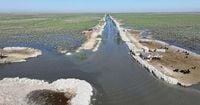In a week marked by high-stakes economic diplomacy and bold financial innovation, Riyadh played host to a pivotal gathering that could reshape the landscape of the Middle East’s financial and trade sectors. On November 19th and 20th, 2025, the Saudi Payments and Settlement Systems Company convened its inaugural Board of Directors meeting in the Saudi capital, drawing a powerful mix of policymakers, financiers, and industry leaders from more than seventy nations. The event, which unfolded under the auspices of the Saudi Arabian Monetary Authority (SAMA) and the stewardship of Minister of Industry and Mineral Resources Bandar bin Ibrahim Al-Khorayef, signaled the Kingdom’s ambitious drive to fortify its position as a global financial and trade hub.
According to Al Jazeera, the gathering was more than a routine boardroom affair. It marked the official launch of the Saudi Payments and Settlement Systems Company as a joint stock entity, a move designed to accelerate the development of an integrated digital financial infrastructure in Saudi Arabia. More than forty shareholders representing major financial institutions, banks, and SAMA itself took part, joined by representatives from government agencies and over three hundred participants from more than seventy Saudi and international companies. The turnout alone underscored the gravity of the occasion and the scale of the Kingdom’s ambitions.
The meeting’s agenda was as sweeping as it was urgent. At its core was the Kingdom’s Vision 2030 blueprint, a bold plan to diversify the Saudi economy away from oil dependency and toward a future driven by innovation, sustainability, and global integration. The new company’s mandate is clear: to improve payment systems and settlement processes, ensuring Saudi Arabia’s financial sector is not just keeping pace with global trends but setting them. As participants discussed practical steps to achieve these goals, the sense of optimism was palpable. "The launch of the Saudi Payments and Settlement Systems Company is a cornerstone in our journey toward a fully digital financial infrastructure," one participant was quoted as saying by Al Jazeera.
This forward-looking approach is not happening in a vacuum. The forum was part of a larger event, the inaugural Global Partners Forum of the Saudi Export-Import Bank, which ran under the theme "Empowering Global Trade: Building Bridges of Cooperation for a Diverse and Sustainable Economic Future." The forum’s mission was to foster dialogue and strategic partnerships across regional, continental, and global markets, with a special emphasis on innovation in export financing. It brought together over forty international speakers, including senior leaders from export-import banks, financial institutions, government agencies, development organizations, and commercial enterprises.
Attendees found themselves immersed in a dynamic environment designed to spark collaboration and practical problem-solving. The accompanying exhibition showcased cutting-edge solutions and innovations from both local and international financial and developmental institutions, as well as private sector representatives in manufacturing and logistics. For many, it was a rare opportunity to see the latest advancements in financial technology and trade facilitation up close.
But while Riyadh was busy charting a digital financial future, regional complexities continued to shape the broader economic narrative. Just days before, Iraq was preparing to receive a high-level Turkish delegation in Baghdad, with water rights and oil exports at the top of the agenda. As reported by Al Mada, the Turkish team, which included senior officials and experts, was set to discuss legal frameworks to guarantee both countries’ interests—especially Iraq’s share of the Tigris and Euphrates rivers, and the resumption of oil exports through Turkey’s Ceyhan port. These issues are anything but academic: Iraq faces severe drought and historically low water reserves, with the Ministry of Water Resources warning that 2025 could be the driest year since 1933.
Experts have pointed to Turkish dam construction and Iranian water diversion as major contributors to Iraq’s water crisis, which threatens millions of livelihoods and accelerates desertification and internal migration. The United Nations ranks Iraq among the five countries most affected by climate change, while the World Bank has estimated that Baghdad will need more than $233 billion in investments by 2040 to confront these challenges and transition to a "green and sustainable" development model.
The Turkish delegation’s visit comes on the heels of an important trip by Iraqi Deputy Prime Minister and Foreign Minister Fuad Hussein to Ankara, where both sides held what were described as "important" talks on water and bilateral cooperation mechanisms. The renewed dialogue is widely seen as an attempt to break the deadlock that has plagued relations, particularly as water scarcity increasingly threatens Iraq’s food and agricultural security.
Oil, too, remains a delicate balancing act. The upcoming talks are expected to address the resumption of oil exports from Iraq’s Kurdistan region through Ceyhan, which have been halted for over a year due to legal disputes and an international arbitration ruling requiring Ankara to pay compensation to Baghdad. Observers suggest that both countries are eager to hammer out a comprehensive agreement that would restore trust, guarantee the legal flow of oil, and secure much-needed revenues for Iraq, while reinforcing Turkey’s role as a vital energy corridor to Europe.
Despite the political and historical complexities that have often strained Turkish-Iraqi relations, the mounting environmental and economic pressures are forcing both sides to seek practical, mutually beneficial solutions. Analysts believe the upcoming visit could pave the way for new executive agreements, including joint water management, scheduled water releases based on seasonal needs, and technical and economic settlements in the oil sector. As one analyst put it, "The circumstances are pushing Baghdad and Ankara to find realistic solutions that preserve shared interests and prevent further environmental and economic tensions in the region," according to Al Mada.
Back in Riyadh, the mood was one of cautious optimism. The launch of the Saudi Payments and Settlement Systems Company and the Global Partners Forum are seen as vital steps toward establishing Saudi Arabia as a linchpin of global trade and financial flows. By bringing together public and private sector leaders from around the world, the Kingdom is betting that open dialogue, innovative thinking, and strategic partnerships will deliver the robust, sustainable growth it seeks.
As the dust settles on a week of landmark meetings and high-level negotiations, one thing is clear: the Gulf region is at a crossroads, with decisions made in Riyadh and Baghdad echoing far beyond their borders. Whether it’s digital finance, water management, or energy diplomacy, the choices made today will shape the region’s economic and environmental future for decades to come.




